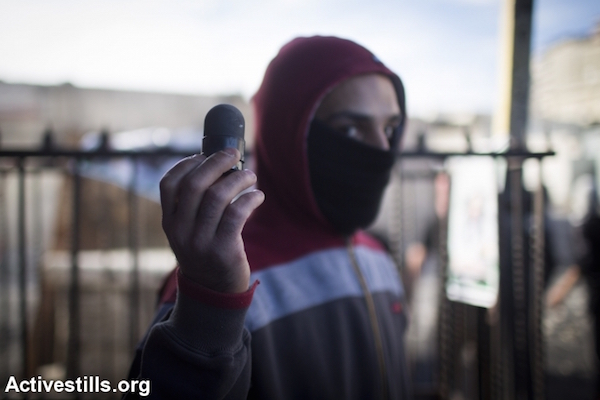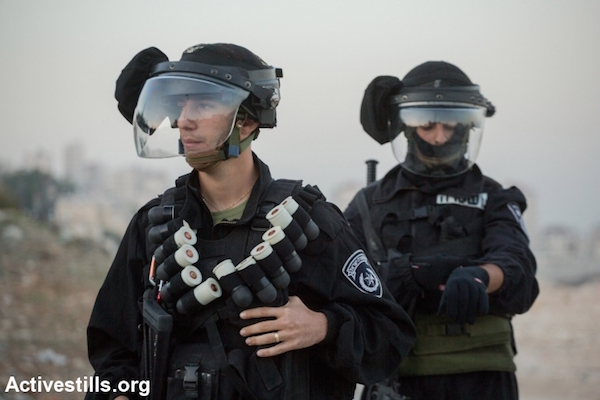A number of Palestinian children have lost some or all of their sight in the past year as a result of Israeli crowd control measures. Rights group appeals to the attorney general.

Following a series of shootings by Israeli security forces which have caused Palestinian minors to lose all or part of their eyesight, Zakariya Julani, a 13-year-old boy from Shuafat refugee camp, lost his left eye after being shot in the head by a Border Police officer last Tuesday. As with most of the other children before him, Julani had been struck by a 40mm black sponge-tipped bullet, designed to be a non-lethal form of riot control but which has caused a drastic surge in injuries —and at least one death — since its introduction in July 2014. These bullets replaced blue sponge-tipped bullets, which were lighter and therefore less harmful.
Junari is at least the fifth minor to suffer a severe eye injury in this way since last summer [Heb]. On July 27, 2014, a 14-year-old boy was shot in the face with a sponge-tipped bullet near Bab al-Hura, in Jerusalem’s Old City, suffering a fractured eye socket and a brain hemorrhage.
On August 1, Ala Hamdan, a 14-year-old girl, was shot in the face by a sponge-tipped bullet while standing at the second-floor window of her family home in Issawiya, East Jerusalem. She required stitches, and was left with damaged eyesight.
On November 13, an 11-year-old boy, Salah Suleiman, was also shot in the face with a sponge-tipped bullet, losing one eye and damaging the eyesight in his second eye. He is now in danger of going completely blind.
A day later, 10-year-old Mayar Amran Twafic al-Natsheh was hit in the face by a rubber-coated steel bullet while in the car with her family, while driving near Shuafat refugee camp at the time of the attack. According to witnesses, the bullet came through the window of the car and struck al-Natsheh, leaving her with a fractured skull (the fate of her eyesight is unclear).

On December 24, 2014, a neighbor of Suleiman’s, 5-year-old Mohammed Jamal Obeid, was shot in the face with a rubber-coated bullet after getting off his school bus in Issawiya, suffering damage to his eyesight.
At the beginning of March, the Association for Civil Rights in Israel (ACRI) contacted Police Commissioner Yohanan Danino and the Attorney General Yehuda Weinstein to request an immediate halt to the use of sponge-tipped bullets by the Israeli Police until a full investigation into their safety had been conducted. The petition cited the proliferation of injuries caused by sponge-tipped bullets, including two fractured jaws and a ruptured spleen in addition to the cases listed above. This followed ACRI’s letter in October to the Jerusalem district commander of the Israel Police, about the disproportionate use of force in Issawiya, which had been subjected to prolonged and severe collective punishment by Israeli security forces.
The litany of grievous injuries to both minors and adults at the hands of the Israeli Police and other security forces is indicative of their improper use of firearms, either because officers are intentionally using them irregularly, or because they are insufficiently accurate to be used without causing accidental casualties in densely-populated, built-up areas.
Certainly, that Israeli security forces on both sides of the Green Line have a track record of taking pot shots at Palestinians not engaged in any kind of violent activity, whether in a conflict situation or not, speaks to a ‘trigger-happy’ mentality which will continue to cause death and injury to Palestinian civilians unless the underlying attitudes dictating such behavior are addressed.
Furthermore, the reluctance of the police to publish their rules of engagement means that disproportionate violence by officers is difficult to address legally (a situation that ACRI has been working to overturn). It also recently transpired that the new black sponge-tipped bullets were in use for over six months before training on their use was conducted and regulations were issued — the same six-month period that saw them cause such a large number of serious injuries.
The lack of transparency facilitates the lack of accountability, and as long as individuals in an over-armed and under-regulated set of security forces continue to lose their heads, innocent Palestinians will continue to lose their eyes — and their lives.

